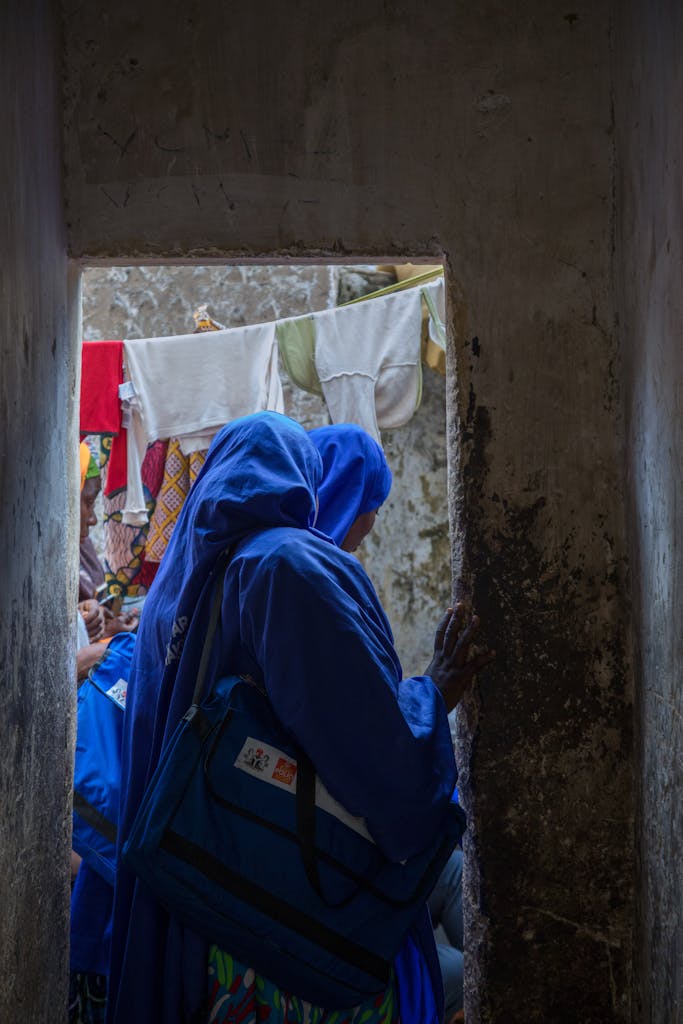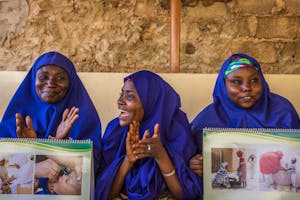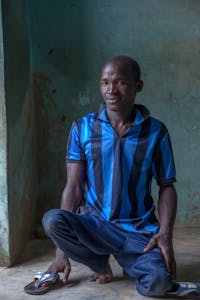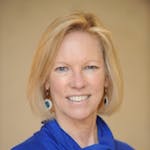Wearing a white turban and robe embroidered in bright blue thread, Alhaji Muhammad Wada sits in front of a colorful mural in Kano City, Nigeria, talking passionately about protecting children in his community. A Muslim call-to-prayer — the azan — echoes in the distance.
As a traditional leader in a country largely ruled by tribal politics, Wada — who goes by the title of “Sarkin Yakin of Kano” — not only has the eyes and ears of the city’s residents, but today he has the attention of a group of journalists.
The reporters are interviewing him about a story that some health experts never thought would be told: For three years, Nigeria has reported zero cases of wild polio, a debilitating virus that paralyzes children, but can be prevented with vaccines. As recently as 2012, Nigeria was home to more than half of all polio cases in the world.
As one of the least developed nations in the world when it comes to health care, infrastructure, and access to education and food, Nigeria ranks as one of the furthest behind from achieving the Sustainable Development Goals (SDGs), a universal agenda adopted at the United Nations to help people everywhere thrive. One of these 17 interconnected SDGs is Goal 3: Good Health and Well-Being, a critical achievement required to unlock success for all other goals.
Last year, Nigeria surpassed India as the country with the most people living in extreme poverty and by 2030, the country is projected to have the third lowest life expectancy in the world. There is only 1 doctor for every 5,500 people.
It is also the last wild polio-endemic country on the entire continent of Africa — until now.
A New Kind of Gospel
Wada is a passionate believer in the power of vaccines, having witnessed firsthand the devastating consequences of polio on children in his community. He is one of more than 30 religious and traditional leaders in Kano state who are working with UNICEF and the Bill & Melinda Gates Foundation to eradicate wild polio, in part by tackling a growing problem across the globe — what the World Health Organization (WHO) calls “vaccine hesitancy,” a distrust of the proven science and medical research behind immunization that has helped the planet eradicate diseases like smallpox.
This is no easy feat in a country where armed groups continue to prevent children from getting the vaccines they need, and anti-vaccination myths persist. These myths include dangerous falsehoods that vaccines are impure or cause sterility. Some community health workers have met parents who once hid their children under beds when vaccinators came knocking.
That’s why Wada and other traditional leaders are preaching a new kind of gospel — one that combines the power of faith with the proven benefits of science. They’re using the teachings of Islam to educate communities about the value of educating girls, breastfeeding, and routine immunization. By collaborating with faith leaders, the polio team is able to build trust with families.

Two members of UNICEF's all-woman volunteer network travel door-to-door in Kano State, Nigeria. (©Andrew Esiebo/UN Foundation)

Children under five are the most vulnerable to polio. Once infected, there is no cure. (©Andrew Esiebo/UN Foundation)
The other major challenge is access. In a country that lacks roads in some of the most remote areas, reaching rural families can be especially difficult.
These leaders are not alone. They’re joined by a network of volunteers — all of whom are women — who serve as trusted community ambassadors of sorts, traveling door-to-door to educate households about immunization and administer the oral version of the polio vaccine as drops under the tongue.
Fatima Zakari works closely with these so-called “Volunteer Community Mobilizers” — or VCMs, as they are known. As an area facilitator for the local government, she helps traditional leaders recruit and train volunteers, each of whom is responsible for anywhere from 350 to 500 households in their regions. To date, 4.4 million children in Nigeria under the age of 5 have been vaccinated, according to UNICEF.
Zakari says these volunteers are crucial for UNICEF’s immunization outreach because services like these rely on personal relationships and trust.
“They are well-known and accepted by the community,” she says. “They are part of the community.”
These volunteers are mainly recruited from areas experiencing a high number of polio vaccine refusals, Zakari says. These women are typically 20 to 50 years old, well-known, and well-respected in their communities, some of whom can read and write in Hausa, the local language. Prospective candidates are then interviewed and, if selected, take part in a UNICEF-led clinical training program that teaches a variety of topics, including data management, communication, and how to spot signs of the disease.
Innovative approaches like these are part of a broader commitment by UN Secretary-General António Guterres to modernize the United Nations by embracing smarter technology, practices, and partnerships.
 A group of Volunteer Community Mobilizers at a health center in Kano State, Nigeria. (©Andrew Esiebo/UN Foundation)
A group of Volunteer Community Mobilizers at a health center in Kano State, Nigeria. (©Andrew Esiebo/UN Foundation)
Because of their success vaccinating vulnerable children, what began as a community of volunteers to fight polio has since evolved into an effective and integral part of Nigeria’s rural health care system.
Beyond administering the polio vaccine, these volunteers now cover a wide range of health topics during their household visits to keep families safe and healthy. They educate households on sanitation and hand-washing, the importance of prenatal care, the advantages of breastfeeding, and how to treat child malnutrition with therapeutic foods. They’re even trained to spot signs of emerging health threats like Ebola.
These volunteers also help UNICEF and the government of Nigeria track vital statistics like births and deaths, which can help authorities and agencies better understand the health care needs of a particular community — information that is crucial to understanding gaps as well as gains in health care access.
from survival to success
At the Gwagwarawa Health clinic in Kano state, you can still witness polio’s lifelong consequences in survivors like Addau Saidu, who was paralyzed as a young boy by the disease, which invades the nervous system and mainly affects children under the age of five.
 Addau Saidu is a polio survivor who now works with UNICEF to spread the word
Addau Saidu is a polio survivor who now works with UNICEF to spread the word
about the importance of vaccines in Kano State, Nigeria. (©Andrew Esiebo/UN Foundation)
Today, Saidu relies on a three-wheeled motorcycle to help UNICEF spread the word about the importance of the polio vaccine. “I thank God for the life I am living, but I am not comfortable,” Saidu told Foreign Policy in an interview last month.
“I want to tell the world that they should immunize their kids—especially in this area.”
Kabiru Rabiu, UNICEF’s polio leader in Kano State, says he has seen too many people crippled by polio and begging for alms in the street. Some are even stigmatized by their own families. He says he met one mother who regretted shunning vaccinations; today her child is permanently handicapped because of the disease.
Because there is no cure for polio, it can only be prevented with a vaccine — one that has been incredibly effective. Since 1988, thanks to global immunization efforts, cases of wild polio have dropped more than 99%, from an estimated 350,000 cases worldwide to just 33 reported last year.
These efforts have been spearheaded by a public-private partnership known as the Global Polio Eradication Initiative. Led by national governments, the initiative includes five core partners: WHO, Rotary International, the U.S. Centers for Disease Control and Prevention (CDC), UNICEF, and the Bill & Melinda Gates Foundation.
Reaching three years without a single case of wild polio in Nigeria is not an arbitrary milestone. Once this data is evaluated and confirmed by WHO, the agency can officially certify the country as having eliminated the disease, leaving just two nations on the planet — Pakistan and Afghanistan — as the final frontiers for battling wild polio.
None of this progress in Nigeria would have been possible without the grassroots, trust-building efforts of traditional leaders like Wada and the network of women making household visits across the country.
“We live with them, we talk with them,” Wada says of the relationship between leaders, volunteers, and the public. “They respect us, we respect them.”
Want to learn more about how the UN is innovating to improve lives? Sign up to be a champion of innovation.
Innovation in Action shares the stories of how the UN is working with partners to pilot, test, and scale new ideas and new ways of working to deliver better results for people on the ground.
From using artificial intelligence to better understand peoples’ needs to innovative methods to reduce maternal and infant mortality to reimagined partnerships and new approaches to mediation, the UN is working across issues and sectors to create dynamic and impactful solutions. The series has been developed with input and support from the UN, including the UN Innovation Network.





